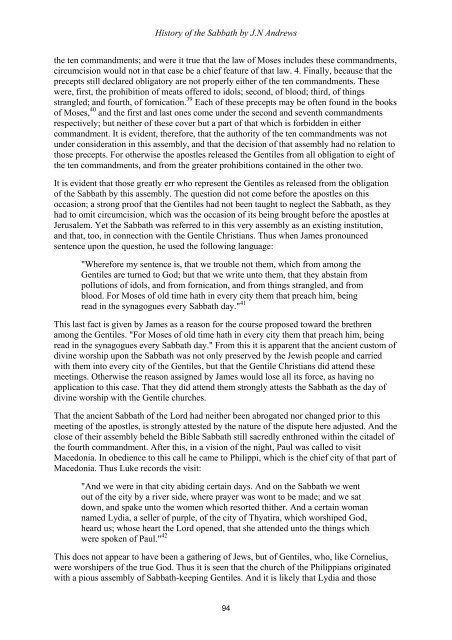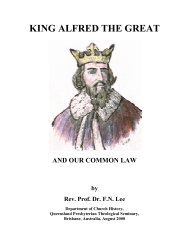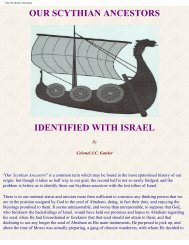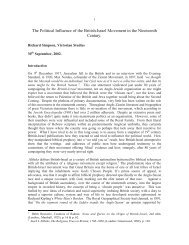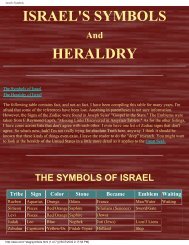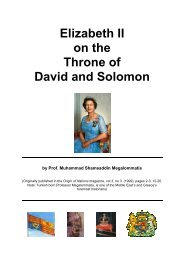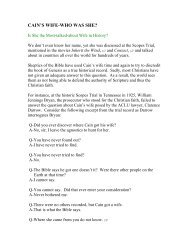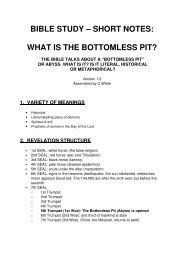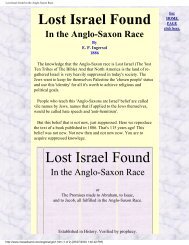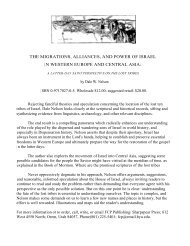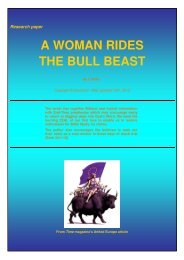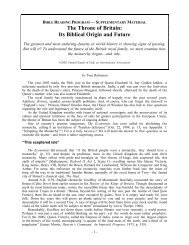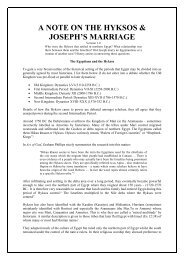HISTORY OF THE SABBATH - Friends of the Sabbath Australia
HISTORY OF THE SABBATH - Friends of the Sabbath Australia
HISTORY OF THE SABBATH - Friends of the Sabbath Australia
You also want an ePaper? Increase the reach of your titles
YUMPU automatically turns print PDFs into web optimized ePapers that Google loves.
History <strong>of</strong> <strong>the</strong> <strong>Sabbath</strong> by J.N Andrews<strong>the</strong> ten commandments; and were it true that <strong>the</strong> law <strong>of</strong> Moses includes <strong>the</strong>se commandments,circumcision would not in that case be a chief feature <strong>of</strong> that law. 4. Finally, because that <strong>the</strong>precepts still declared obligatory are not properly ei<strong>the</strong>r <strong>of</strong> <strong>the</strong> ten commandments. Thesewere, first, <strong>the</strong> prohibition <strong>of</strong> meats <strong>of</strong>fered to idols; second, <strong>of</strong> blood; third, <strong>of</strong> thingsstrangled; and fourth, <strong>of</strong> fornication. 39 Each <strong>of</strong> <strong>the</strong>se precepts may be <strong>of</strong>ten found in <strong>the</strong> books<strong>of</strong> Moses, 40 and <strong>the</strong> first and last ones come under <strong>the</strong> second and seventh commandmentsrespectively; but nei<strong>the</strong>r <strong>of</strong> <strong>the</strong>se cover but a part <strong>of</strong> that which is forbidden in ei<strong>the</strong>rcommandment. It is evident, <strong>the</strong>refore, that <strong>the</strong> authority <strong>of</strong> <strong>the</strong> ten commandments was notunder consideration in this assembly, and that <strong>the</strong> decision <strong>of</strong> that assembly had no relation tothose precepts. For o<strong>the</strong>rwise <strong>the</strong> apostles released <strong>the</strong> Gentiles from all obligation to eight <strong>of</strong><strong>the</strong> ten commandments, and from <strong>the</strong> greater prohibitions contained in <strong>the</strong> o<strong>the</strong>r two.It is evident that those greatly err who represent <strong>the</strong> Gentiles as released from <strong>the</strong> obligation<strong>of</strong> <strong>the</strong> <strong>Sabbath</strong> by this assembly. The question did not come before <strong>the</strong> apostles on thisoccasion; a strong pro<strong>of</strong> that <strong>the</strong> Gentiles had not been taught to neglect <strong>the</strong> <strong>Sabbath</strong>, as <strong>the</strong>yhad to omit circumcision, which was <strong>the</strong> occasion <strong>of</strong> its being brought before <strong>the</strong> apostles atJerusalem. Yet <strong>the</strong> <strong>Sabbath</strong> was referred to in this very assembly as an existing institution,and that, too, in connection with <strong>the</strong> Gentile Christians. Thus when James pronouncedsentence upon <strong>the</strong> question, he used <strong>the</strong> following language:"Wherefore my sentence is, that we trouble not <strong>the</strong>m, which from among <strong>the</strong>Gentiles are turned to God; but that we write unto <strong>the</strong>m, that <strong>the</strong>y abstain frompollutions <strong>of</strong> idols, and from fornication, and from things strangled, and fromblood. For Moses <strong>of</strong> old time hath in every city <strong>the</strong>m that preach him, beingread in <strong>the</strong> synagogues every <strong>Sabbath</strong> day." 41This last fact is given by James as a reason for <strong>the</strong> course proposed toward <strong>the</strong> brethrenamong <strong>the</strong> Gentiles. "For Moses <strong>of</strong> old time hath in every city <strong>the</strong>m that preach him, beingread in <strong>the</strong> synagogues every <strong>Sabbath</strong> day." From this it is apparent that <strong>the</strong> ancient custom <strong>of</strong>divine worship upon <strong>the</strong> <strong>Sabbath</strong> was not only preserved by <strong>the</strong> Jewish people and carriedwith <strong>the</strong>m into every city <strong>of</strong> <strong>the</strong> Gentiles, but that <strong>the</strong> Gentile Christians did attend <strong>the</strong>semeetings. O<strong>the</strong>rwise <strong>the</strong> reason assigned by James would lose all its force, as having noapplication to this case. That <strong>the</strong>y did attend <strong>the</strong>m strongly attests <strong>the</strong> <strong>Sabbath</strong> as <strong>the</strong> day <strong>of</strong>divine worship with <strong>the</strong> Gentile churches.That <strong>the</strong> ancient <strong>Sabbath</strong> <strong>of</strong> <strong>the</strong> Lord had nei<strong>the</strong>r been abrogated nor changed prior to thismeeting <strong>of</strong> <strong>the</strong> apostles, is strongly attested by <strong>the</strong> nature <strong>of</strong> <strong>the</strong> dispute here adjusted. And <strong>the</strong>close <strong>of</strong> <strong>the</strong>ir assembly beheld <strong>the</strong> Bible <strong>Sabbath</strong> still sacredly enthroned within <strong>the</strong> citadel <strong>of</strong><strong>the</strong> fourth commandment. After this, in a vision <strong>of</strong> <strong>the</strong> night, Paul was called to visitMacedonia. In obedience to this call he came to Philippi, which is <strong>the</strong> chief city <strong>of</strong> that part <strong>of</strong>Macedonia. Thus Luke records <strong>the</strong> visit:"And we were in that city abiding certain days. And on <strong>the</strong> <strong>Sabbath</strong> we wentout <strong>of</strong> <strong>the</strong> city by a river side, where prayer was wont to be made; and we satdown, and spake unto <strong>the</strong> women which resorted thi<strong>the</strong>r. And a certain womannamed Lydia, a seller <strong>of</strong> purple, <strong>of</strong> <strong>the</strong> city <strong>of</strong> Thyatira, which worshiped God,heard us; whose heart <strong>the</strong> Lord opened, that she attended unto <strong>the</strong> things whichwere spoken <strong>of</strong> Paul." 42This does not appear to have been a ga<strong>the</strong>ring <strong>of</strong> Jews, but <strong>of</strong> Gentiles, who, like Cornelius,were worshipers <strong>of</strong> <strong>the</strong> true God. Thus it is seen that <strong>the</strong> church <strong>of</strong> <strong>the</strong> Philippians originatedwith a pious assembly <strong>of</strong> <strong>Sabbath</strong>-keeping Gentiles. And it is likely that Lydia and those94


